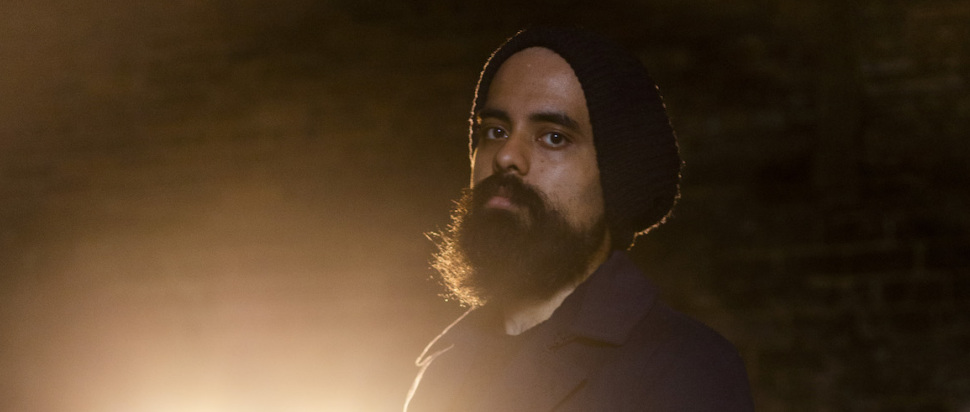The Political Polymath: Kapil Seshasayee interview
On his scintillating debut, Kapil Seshasayee confronted the horrors of India’s caste system. Now, he’s turning his fire on Bollywood bigotry
“It felt like people took the political message to heart more when I played with a live band."
For Kapil Seshasayee, the message might be more important than the music. That isn’t to dismiss the highly inventive sound he’s spent the past few years cultivating, a beguiling blend of classical Indian influences and contemporary western ones. Rather it's to admire the hyper-focused urgency of the manner in which his songs address problems that, while rooted in his ancestral home of India and south Asia more generally, actually affect the diaspora the world over, with parallels in the western world – and particularly, in his hometown of Glasgow – not difficult to find.
Seshasayee’s powerful 2018 debut album, A Sacred Bore, took stinging aim at the atrocities committed in the name of India’s caste system, a social stratum that has been in place for centuries but that, as Seshasayee vitally points out, remains a brutal obstacle to social progress today. Tracks on the record referenced honour killings that have taken place in the modern world, such as the horrific 2000 murder of Jaswinder Kaur Sidhu in Canada, killed by her own family for marrying in secret. “It’s a bigotry that’s travelled around the world,” he says over Zoom. “It’s almost inescapable, in a sense.”
Now, Seshasayee is readying a second album, Laal, which looks set only to further the mission he set out on with A Sacred Bore. He's expanding sonically, with a full band involved and an already ambitious sonic palette being expanded to incorporate R'n'B, psychedelia and hyperpop, and thematically, as he zeroes in on what he sees as one of the major culprits for India’s lack of social equality – Bollywood, and the negative stereotypes it perpetuates. Eager to avoid making sweeping but ultimately vague statements, Seshasayee has singled out particular films to help make his case. “There isn’t openness to interpretation. For me, all too often now, a band can present a really bland message that you can project any nuance onto – I’m not interested in that. I want to be very steadfast and concise."
Accordingly, he’s carefully chosen examples to reinforce his argument. Laal won’t be released until early next year, but we’ve already had a clutch of singles from it, including driving rocker The Gharial, named after a type of crocodile considered sacred in traditional Hindu mythology. In the 2020 Bollywood film Tanhaji there's a scene that appears tailor-made to stoke division between religious groups; a gharial is sacrilegiously grilled and eaten by a Muslim in the offending sequence.
“It’s about encouraging nationalism and turning people against each other,” Seshasayee explains, “and this is a film that made billions of pounds, essentially. When you point to specific examples, it stops people from straw-manning you, from dismissing the problem as one that isn’t contemporary. Well, this film is barely two years old. It is still happening, all the time.”
Another single from last year, The Pink Mirror, takes its title from a 2003 film by queer director Sridhar Rangayan, which remains banned in India. Again, for Seshasayee, the explicitness of his message is key. “If you were to say, 'censorship of LGBTQ voices is a bad thing', or, 'it’s a problem that parts are being written for minorities by people with no lived experience', that seems agreeable enough in a pub conversation, but you put it into a song and it seems vague, and inane, and like virtue signalling. So, if I can point to something like the banning of The Pink Mirror, I can start a conversation about why trans people only ever show up in Bollywood as comic relief or as demonic antagonists. There’s a long history of really tone deaf caricatures of trans people, and those solidify in the mind of the public, so is it really a surprise that transphobia is rife in India?”
He understands, too, that these problems are widespread; they do not exist in a vacuum. Even outwith the south Asian diaspora, nationalism and transphobia are steeply on the rise in Britain, too. “There are so many parallels,” he agrees. “A good example over here is how sanitised the view of Pride has become, especially as corporations and brands have co-opted it; it’s seen as a party, rather than a protest. In India, there’s a similar issue with three-dimensional human beings, with their own struggles, wants and needs, not being seen as such because of the way they’re dehumanised in popular media.”
For Seshasayee, then, it’s crucial to combat negative media with positive, and the bigger the platform the better, as he found back in May when a back-and-forth on casteism within his Twitter DMs with rapper Lil B led to the searing collaboration Hill Street Reprise. “At the end of the day, I write pop songs, and there’s a finite amount they can achieve. But we have to at least challenge these issues. The more we can normalise discussion of them, the more we can get people to engage with them."
Kapil Seshasayee plays Summerhall, Edinburgh, 15 Aug; Jupiter Rising, Jupiter Artland, Wilkieston, 27-29 Aug
Seshasayee will also debut his forthcoming new record, Laal, in full ahead of release with a full live band and conceptual light show at King Tut's, Glasgow, 24 Aug
Laal is set for release early 2022
